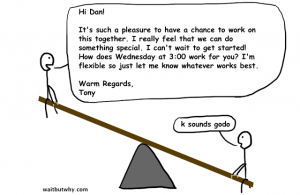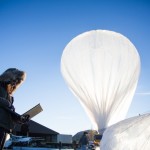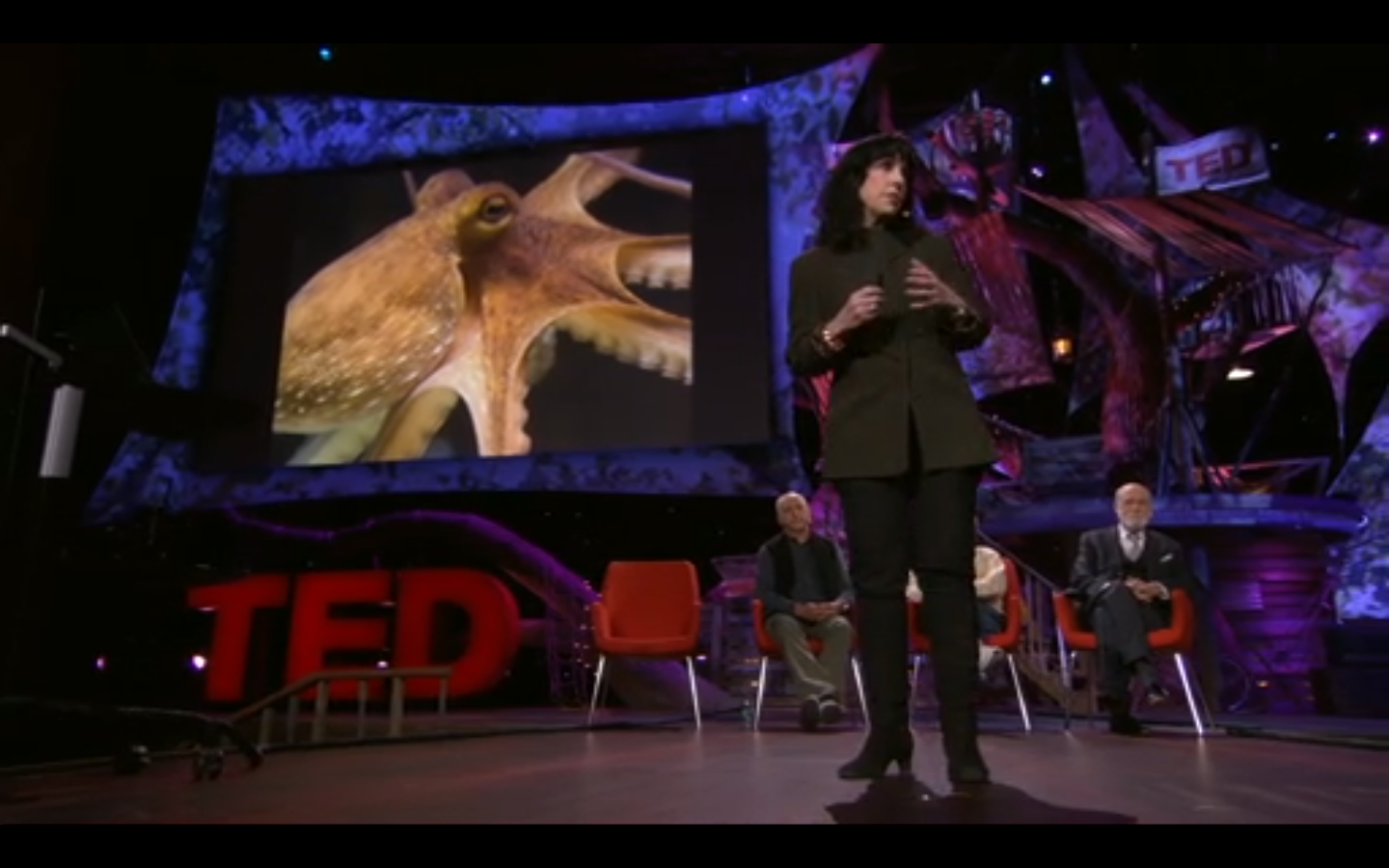 Email is a necessary part of everyday life today. This cartoon-illustrated article outlines many of the most uncomfortable aspects of email, and provides suggestions for minimizing discomfort.
Email is a necessary part of everyday life today. This cartoon-illustrated article outlines many of the most uncomfortable aspects of email, and provides suggestions for minimizing discomfort.
waitbutwhy.com/2013/12/11-awkward-things-about-email.html
Most of us have an uneasy relationship with big databases: We take advantage of the convenience and freedom they bring to us, but we don’t really like the fact that they know so much about us. Singer/songwriter Vienna Teng captures the tension that exists between those contradictory feelings in her beautiful, slightly chilling Hymn of Acxiom. We’ve included a YouTube video with the song’s recording as well as links to an article telling the story behind the song, and a page with lyrics. All three are highly recommended.
Vienna Teng Sings about Surveillance in ‘Hymn of Acxiom’
Lyrics for ‘Hymn of Acxiom’
Key words: databases, big data, privacy, surveillance
Icon: crosscurrents
 Edward Snowden made a decision that changed the world. By leaking top secret government documents to the press, he revealed that US surveillance of private and public citizins goes far beyond what most of us had previously imagined. Because of those leaks, people all around the world are asking important questions about the balance between privacy and security in a free society. In a chilling statement to the BBC, Snowden claimed that he’d accomplished his mission by raising those questions. What do you think?
Edward Snowden made a decision that changed the world. By leaking top secret government documents to the press, he revealed that US surveillance of private and public citizins goes far beyond what most of us had previously imagined. Because of those leaks, people all around the world are asking important questions about the balance between privacy and security in a free society. In a chilling statement to the BBC, Snowden claimed that he’d accomplished his mission by raising those questions. What do you think?
theguardian.com/world/2013/dec/24/edward-snowden-channel-4-christmas-day-message
 Don’t look now, but your phone might be a looking glass that enables you to peer into a unique, irresistible fantasy world. Technologists and artists at Google and Motorola just introduced Windy Day, a free virtual reality interactive story that may represent a whole new form of narrative storytelling. And if you own a Moto X phone, it’s yours for free. Steven Levy tells the story behind the story in this Wired article.
Don’t look now, but your phone might be a looking glass that enables you to peer into a unique, irresistible fantasy world. Technologists and artists at Google and Motorola just introduced Windy Day, a free virtual reality interactive story that may represent a whole new form of narrative storytelling. And if you own a Moto X phone, it’s yours for free. Steven Levy tells the story behind the story in this Wired article.
wired.com/business/2013/10/motorola-google-mouse
 For most of us, the word “addiction” evokes images of people whose lives are controlled by drugs. But for many people—especially younger men—addictions aren’t about chemicals; they’re about technology. This touching NPR story profiles patients in a clinic that specializes in helping tech addicts retake control of their lives.
For most of us, the word “addiction” evokes images of people whose lives are controlled by drugs. But for many people—especially younger men—addictions aren’t about chemicals; they’re about technology. This touching NPR story profiles patients in a clinic that specializes in helping tech addicts retake control of their lives.
npr.org/2013/10/20/238095806/when-playing-video-games-means-sitting-on-lifes-sidelines
 IBM’s Watson hasn’t been sitting on its circuits since it won the special Jeopardy! championship game in 2011. This Wired article describes how doctors are putting Watson to work as an expert advisor to help them diagnose cancer and save lives.
IBM’s Watson hasn’t been sitting on its circuits since it won the special Jeopardy! championship game in 2011. This Wired article describes how doctors are putting Watson to work as an expert advisor to help them diagnose cancer and save lives.
wired.co.uk/news/archive/2013-02/11/ibm-watson-medical-doctor
 Every day millions of people share text, photos, music, and video on the Internet. But until recently, there hasn’t been much interest in sharing non-musical sound. According to Wired contributor Clive Davis, we may be entering a new age of Internet audio. How does that sound to you?
Every day millions of people share text, photos, music, and video on the Internet. But until recently, there hasn’t been much interest in sharing non-musical sound. According to Wired contributor Clive Davis, we may be entering a new age of Internet audio. How does that sound to you?
wired.com/opinion/2013/08/ap_thompson/
 If you live in a city, you probably take the Internet for granted. It’s always on, everywhere you go. But for many people in sparsely populated areas, the Internet is out of reach. In this Wired article, Steven Levy describes how Google is experimenting with a system that delivers the Internet to these people using balloons.
If you live in a city, you probably take the Internet for granted. It’s always on, everywhere you go. But for many people in sparsely populated areas, the Internet is out of reach. In this Wired article, Steven Levy describes how Google is experimenting with a system that delivers the Internet to these people using balloons.
wired.com/business/2013/06/google_internet_balloons/all
When you get past all of the emotional trappings, your money is nothing more than a symbol of value, and it’s only as good as the trust we place in it. This TED talk suggests that we may be headed into an era of multiple monies.
T he Internet was conceived as a way of connecting computers, but its inventors quickly realized that the Internet was a way of connecting people. Now one of those founders, Vint Cerf, is working with Peter Gabriel, Diana Reiss, Neil Gershendfeild, and others to bring dolphins, bonobos, elephants, and other species into the Internet community. This TED talk gives us a peek at the early stages of a research project that could profoundly change our relationship with non-human inhabitants of our planet—and possibly other planets.
he Internet was conceived as a way of connecting computers, but its inventors quickly realized that the Internet was a way of connecting people. Now one of those founders, Vint Cerf, is working with Peter Gabriel, Diana Reiss, Neil Gershendfeild, and others to bring dolphins, bonobos, elephants, and other species into the Internet community. This TED talk gives us a peek at the early stages of a research project that could profoundly change our relationship with non-human inhabitants of our planet—and possibly other planets.
ted.com/talks/the_interspecies_internet_an_idea_in_progress.html